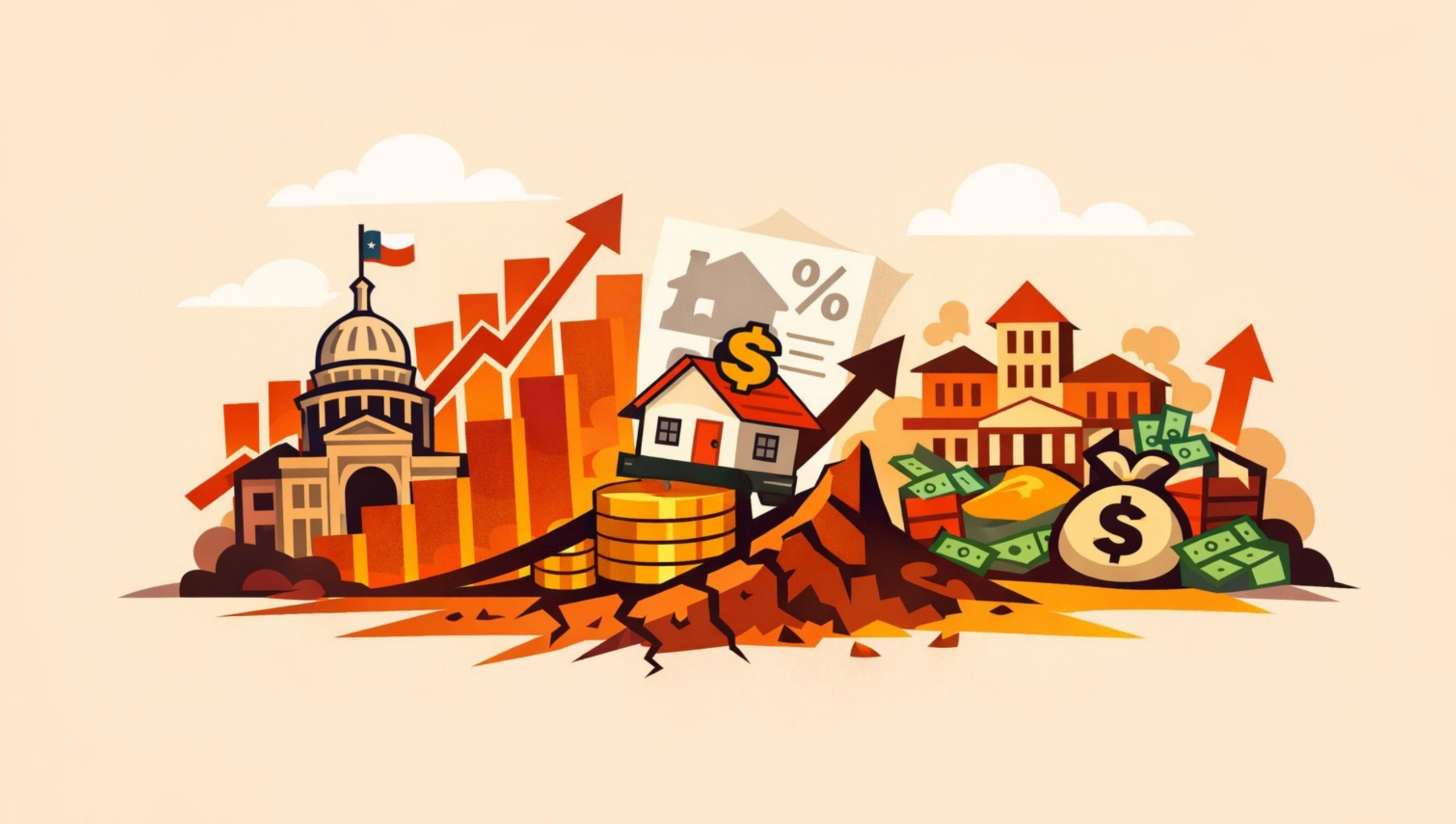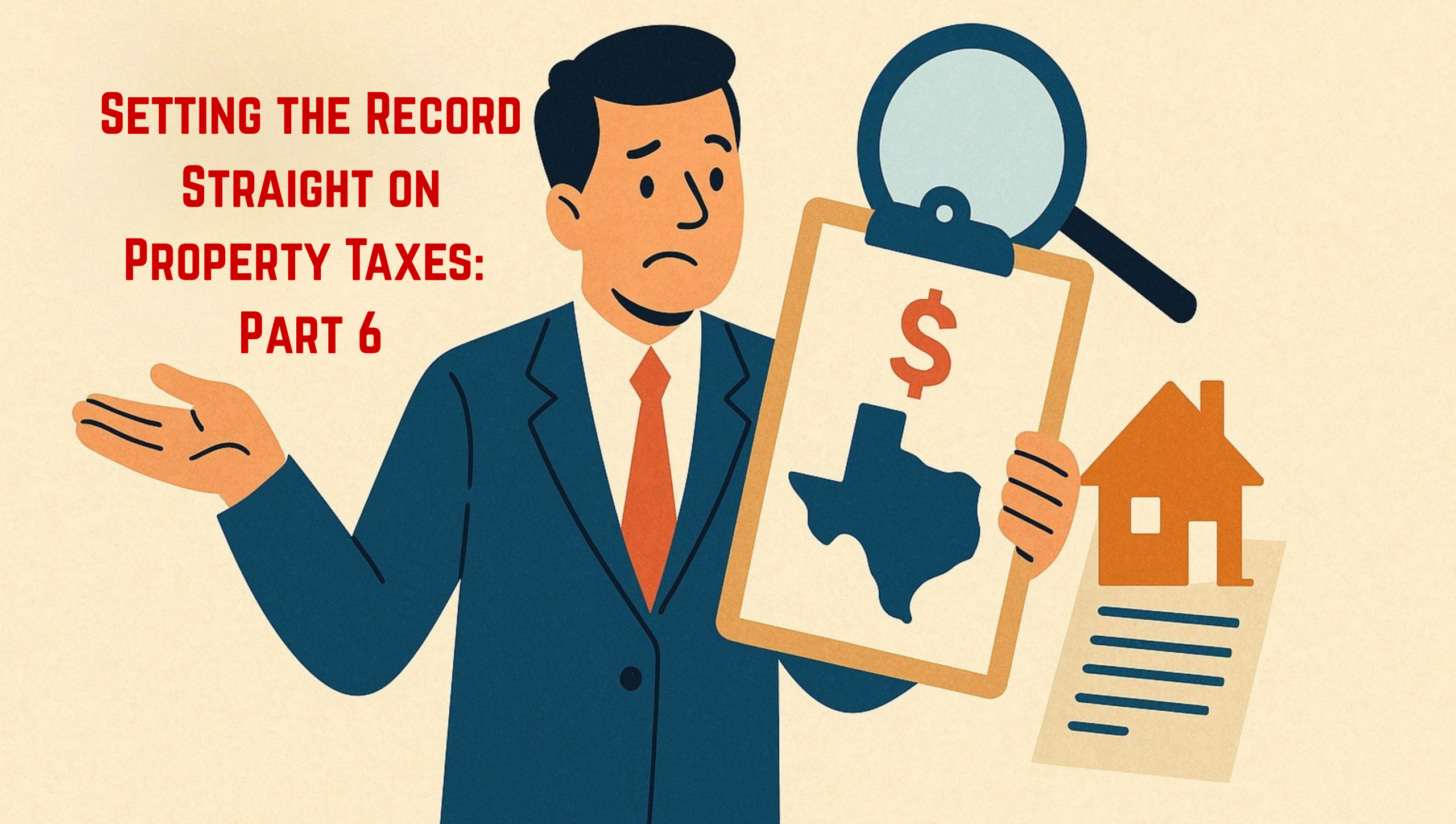Unmasking Taxing Tactics in Texas
In Texas, local governments wield significant authority over taxation and spending decisions that directly impact residents’ financial well-being. Local entities such as cities, counties, school districts, and special districts often employ sophisticated deception strategies to mask the true extent of tax increases and spending growth.
When voters find out, these “games” erode public trust and spotlight tax-and-spend liberals for what they are, even the ones who claim to be “conservative”. In this article, we examine several common deception tactics, highlighting how they result in governments playing “the blame game” to avoid accountability while raising taxes on Texans. By understanding these practices, you’ll be a better advocate for sound fiscal policy.
The Tax Rate Illusion: Minimal Reductions Amid Soaring Appraisals
One of the most common deceptions involves local governments saying “We lowered your taxes” through very slight decreases in the property tax rate while property appraisals rise. In Texas, property taxes are a primary revenue source for almost all local entities, calculated as the tax rate multiplied by the appraised value of properties. When appraisals rise, tax bills often increase accordingly, unless rates are adjusted downward proportionally. Texas developed the “No New Revenue Rate” to help bring accountability, but even that calculation has its flaws.
Consider a scenario where a county lowers its tax rate by a mere 0.01 cent per $100 of valuation, while appraisals surge by 10% or more in a given year. Officials may tout this as a “tax cut,” emphasizing the rate reduction in budget hearings and on campaign literature. In reality, the overall tax liability for homeowners and businesses rise substantially. For instance, data from the Texas Comptroller of Public Accounts indicates that between 2019 and 2023, statewide property values increased by over 40% in many areas, yet many local governments implemented only token rate adjustments. This results in higher revenues without the appearance of raising taxes, allowing entities to fund bloated budgets more discreetly.
Considering how many people pay property taxes through their mortgage, they’ll only notice if their lender requires an increase in their mortgage payment to cover the balance. Even still, when that happens, a significant number of people can’t make sense of it all, and end up eating the increase.
This tactic preys on public misunderstanding of tax mechanics. Taxpayers, focused on their rising bills and growing families, may not immediately connect the dots between spending, appraisals, and rates. Local leaders capitalize on this by framing the narrative around rate “reductions,” as property tax “relief,” diverting attention from the net increase in actual tax collections. When asked, many of the deceitful or inept local officials simply blame the appraisal district.
Misattributing Authority: Blaming the State for Tax Rates
Some local officials go so far as claiming, “the State sets the rate,” which grossly misrepresents the regulatory framework established by Texas law. Let’s be clear: the only thing the State sets regarding local property tax rates are the limits on how much your local governments can increase the tax rate without voter approval. Every taxing entity in Texas is free to adopt a rate as low as they would like.
Officials often invoke this to deflect responsibility, suggesting that state-imposed constraints force their hands. For example, during budget deliberations, a city council might assert that Austin dictates the effective rate, implying helplessness in the face of rising costs.
This narrative conveniently ignores that local entities control spending priorities and can adjust budgets to align with revenue caps. The Texas Legislature designed these guardrails to protect taxpayers from excessive hikes, yet they are portrayed as an excuse for tax hikes. This distortion tends to create more voter apathy, as citizens may believe local leaders lack the ability to do anything about it, which is patently false.
In practice, many jurisdictions opt for the maximum allowable tax rate without an election, quietly amassing additional funds for runaway spending plans.
The Appraisal Blame Game Continued: A Disingenuous Deflection
In Texas, property appraisals are conducted annually by central appraisal districts, with values certified before local entities adopt their budgets—typically by July for the fiscal year starting in October.
The timeline is explicit: Appraisal notices are mailed in April or May, with appeal deadlines in June. By the time budgets are finalized in August or September, all valuations tend to be settled. Thus, blaming appraisers for “unexpected” tax increases is disingenuous, as officials have ample data to project revenues accurately. This tactic shifts accountability away from the entity in question, portraying local leaders as victims of external forces rather than stewards of taxpayer dollars. Inefficiencies in appraisal processes exist, but they do not absolve governments from responsible budgeting based on known figures.
Bond Issuance Deceptions: Promises of No Tax Increases
Another common strategy revolves around bond propositions, where local governments assure voters that “this bond won’t raise your taxes.” While it’s technically accurate that approving a bond doesn’t necessarily immediately alter current tax rates, the long-term implication is inescapable: all new debt we assume needs future revenue to service it.
When they do this, that’s like saying to your spouse, “We can buy this new lawn tractor at Home Depot and our monthly payment won’t increase.” The lawn tractor still has to be paid off, meaning you will be paying that card for longer than you would have, had you not made the purchase.
A school district might propose a $100 million bond for facility upgrades, emphasizing that it fits within existing debt service rates. However, as principal and interest accrue, often over 20-30 years, taxpayers bear the cost. If revenues fall short, rates may need adjustment, or funds may be diverted from operations. Historical data from the Texas Bond Review Board shows that outstanding local debt exceeded $300 billion in 2023, with annual debt service consuming significant portions of budgets. Officials downplay this by focusing on short-term impacts, omitting the burden new debt places on our children and grandchildren.
This assurance misleads voters during bond elections, where ballot language, or public campaigns in support, is often crafted to highlight benefits without detailing fiscal consequences.
Hidden Fees and Surcharges: Taxation by Another Name
Another common approach is to increase water, sewage, and electric rates to increase revenues without the explicit label of “tax increase”. This approach, typically seen in cities, means they may keep the same tax rate from last year, but they increase their service usage rates and divert all “excess funds” to the general fund to avoid a “tax increase”. This approach skips the scrutiny of tax rate votes while disproportionately burdening residents and businesses by increasing the cost of living.
Inefficient Operations
Most critically, local government operations are often highly inefficient, characterized by bureaucratic redundancies, unnecessary projects, and overstaffing. These inefficiencies drive up costs, meaning higher taxes to sustain the bloated bureaucracies and programs. Many entities fail to implement performance audits or zero-based budgeting, allowing legacy programs to remain unexamined.
Another tactic involves deferring maintenance on infrastructure, creating backlogs that require emergency funding—and subsequent tax increases—down the line. Simply put, cities won’t prioritize infrastructure upkeep, and they’ll let conditions get worse and worse until they say, “Hey guys, we need to pass a bond to pay for X, Y, or Z.”
Statutes enable this to a degree. As an example, years ago Granbury ISD’s board of trustees chose to remove school bus life cycle replacements from the Maintenance and Operations (M&O) side of the budget, because the statute allows for school bus purchases through the Interest and Sinking (I&S) side of the budget (read: bonds). This became an unmitigated disaster when voters rejected 3 bonds in a 24 month period. Fortunately, new leadership put bus maintenance and purchases back into the M&O side of the budget, where it belongs.
Unsustainable Spending
Lastly, a point that often fails to get the attention it deserves, and is the root problem in these discussions, is government spending. Governments are not businesses that compete in the marketplace for consumer dollars. Local governments cannot produce their own money. They rely on their residents, their taxpayers, for the funds to sustain operations.
While local governments have an important role to play in society, many local governments are spending money on programs or projects that are not essential or do not fall under the scope of the proper role of government. Most local governments are increasing spending beyond what is responsible and sustainable (local governments, on average, increased spending 57% faster than the growth of population plus inflation over the last decade), in order to fund these unnecessary expenses. Instead of prioritizing the people’s money on essential services like public safety and infrastructure, many elected officials increase budgets, and therefore taxes, in order to feed their spending addiction.
Any discussion regarding the tax burden on Texans must include this most important factor: The more money a local government wants to spend, the more money it must take in taxes.
Conclusion: Move Toward Greater Accountability
In conclusion, the games local governments play in Texas tax discussions undermine the principles of fiscal responsibility. From illusory rate cuts and state blame-shifting to bond deceptions, appraisal excuses, hidden fees, and operational waste, these tactics obscure the true cost of governance.
Texans for Fiscal Responsibility urges voters to demand transparency and sustainable reforms. By staying informed and engaged, citizens can hold leaders accountable, enabling a more efficient and taxpayer-friendly environment. Ultimately, genuine fiscal conservatism requires vigilance to ensure our government serves the people, not the other way around.
Texans for Fiscal Responsibility relies on the support of private donors across the Lone Star State in order to promote fiscal responsibility and pro-taxpayer government in Texas. Please consider supporting our efforts! Thank you!
Get The Fiscal Note, our free weekly roll-up on all the current events that could impact your wallet. Subscribe today!




